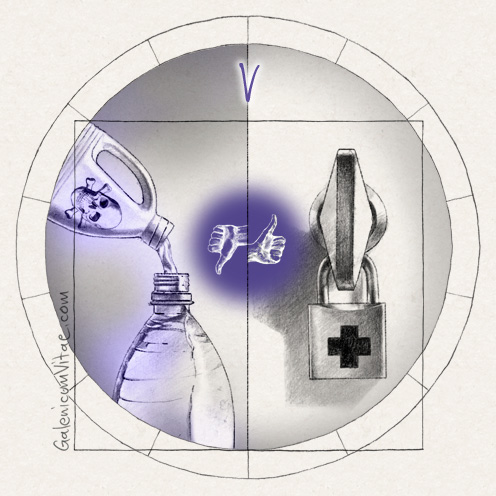- Do not rely on packaging to protect your children (a child resistant container does not mean that it is childproof).
- Never give medicine to a child in the dark, you could give the wrong dose or the wrong medicine.
- Never leave bottles of vitamins or other medications on the kitchen table or nightstand, etc. Children may want to imitate adults and try to take the drugs.
- Never tell a child that medicine is candy.
- Keep all medicine, whether it is prescription medicine or not, in a locked cabinet out of reach of children. Even items that seem harmless, such as toothpaste for brushing teeth, can be harmful in large amounts.
- Always store pills and liquids in their original containers.

Poisonings
Advice
The best prevention against poisoning is to keep the toxic products we have at home stored away and locked, especially when children are present because they are the most likely victims. And never switch the packaging or bottle in which a toxic substance is kept, as this may mislead and confuse anyone, child or adult, who does not know that the liquids have been transferred from one container to another.
These are the most dangerous products:
- Bathrooms and kitchen disinfectants.
- Cleaning or home care products, paint and glue.
- Automotive products such as antifreeze or windshield wiper fluid.
- Beauty products and cosmetics for hair and nails.
- Medications.
- Cockroach sprays and bait.
- Insect repellent.
- Poison for rats and other rodents.
- Solutions for killing weeds and mould.
- Flea and tick shampoo, powder and disinfectant baths for pets.
- Chemicals for swimming pools.
For more information visit:
Poisoning: First aid
http://www.mayoclinic.org/first-aid/first-aid-poisoning/basics/art-20056657
Poisoning First Aid
http://www.redcross.org/prepare/disaster/poisoning
Types of Poisons
http://www.ncpoisoncenter.org/body.cfm?id=59
Creation date: 17/09/2015 - Last modification date: 10/11/2015

 Digestive
Digestive  Blood
Blood Cardiovascular
Cardiovascular Dermatology
Dermatology Genitourinary,
Genitourinary, Hormones
Hormones Infections
Infections Oncology and
Oncology and Musculo-skeletal
Musculo-skeletal Mental health and
Mental health and Parasites
Parasites Respiratory
Respiratory Senses
Senses Various
Various



